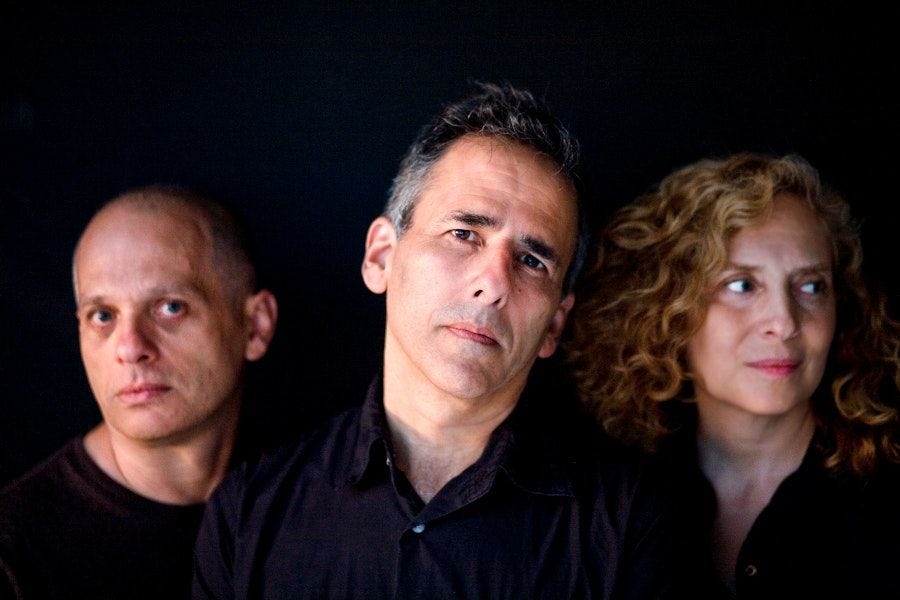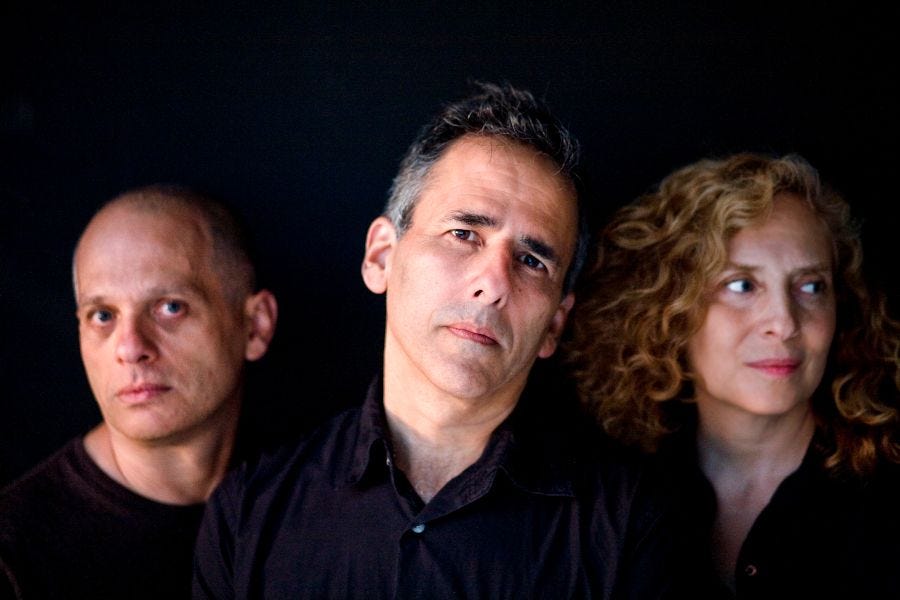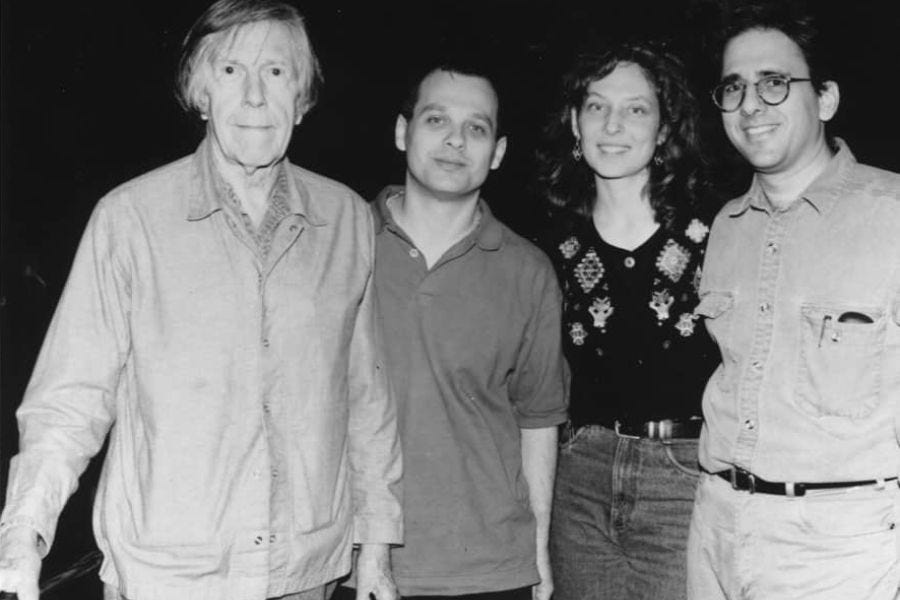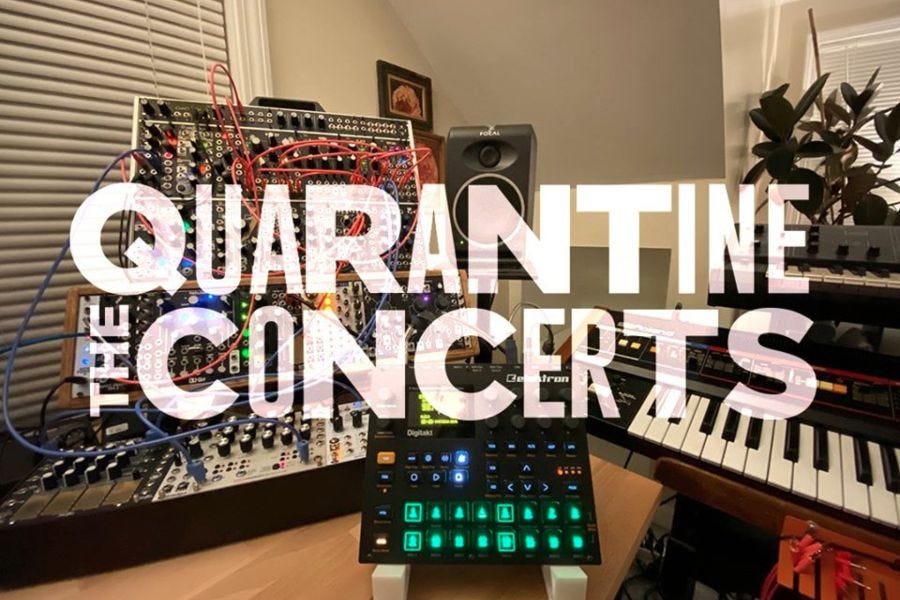Alone, Together
Phil Kline captures a city's gratitude; a transfixing new video by Sarah Cahill and friends; and a chat with Michael Gordon and Julia Wolfe about this year's Bang on a Can Marathon…

Song of a City
I don’t often contribute to making news myself, but I did play a small yet catalytic role in a brand new creation from composer Phil Kline. Reflecting on the whoops, cries, and cheers currently emanating from the windows of New York City apartments and homes at 7pm each night – a show of appreciation for the health professionals and essential workers who’ve worked so hard throughout the COVID-19 crisis – I ventured to suggest in a tweet that Kline might transform those sounds into something magical, à la his splendid boombox caroling procession, Unsilent Night.
Kline, to my surprise and delight, accepted my request, and the resulting composition, “Every Night at 7,” had its premiere in an article by Justin Davidson, published yesterday by Vulture. I urge you to read the story, listen to the track, and pour your heart into your own tribute this evening, wherever you might be.
Video Spotlight
The composer, critic, and scholar Kyle Gann composed Long Night as a graduate student in 1980-81, attempting, in his own words, “to extend the looping technique of Terry Riley’s In C into the ambient/atmospheric area of Harold Budd and Brian Eno.” Gann wrote the piece for three unsynchronized pianists; accordingly, Sarah Cahill, an invaluable Bay Area pianist and radio personality, reasoned that the piece would be ideal for musicians working in isolation. She enlisted two fellow new-music advocates, Joseph Kubera and Adam Tendler, to perform with her in a video directed by her husband, John Sanborn—a pioneering media artist whose extensive credits include work with Robert Ashley, Bill T. Jones, Mikhail Baryshnikov, and the Residents.
Interview: Michael Gordon and Julia Wolfe
“In 1987, we started dreaming of the world we wanted to live in.” The text on the splash page of CanLand, a multimedia archive documenting the lively history of the composer collective Bang on a Can, which opened its virtual doors today at noon. The sentence succinctly states the fundamental motivations of its three founders – Michael Gordon, David Lang, and Julia Wolfe – who turned their aspirations into action that year with the inaugural Bang on a Can Marathon.
The statement continues: “All the boundaries between composers would come down, all the boundaries between genres would come down, all the boundaries between musicians and audience would come down.” For more than two decades, that aim flourished and grew, year after year. Then came the present pandemic, which threw up boundaries around everyone, and caused the postponement of two major Bang on a Can initiatives: Long Play, an extraordinarily ambitious three-day festival encompassing venues throughout Brooklyn, and the Bang on a Can Summer Music Institute at Mass MoCA, fondly known as “Banglewood,” the collective’s seasonal workshop for young musicians and budding journalists.
As journalist and scholar William Robin revealed earlier this week in his must-read newsletter, Industry, this wouldn’t the first time these composers had to rethink major plans at a moment’s notice. Showing ingenuity, gumption, and quick reflexes, Bang on a Can forged a new model for bringing composers, performers, and audience members together: in a six-hour online Marathon scheduled to run from 3pm to 9pm on Sunday, May 3. Among the participants are Meredith Monk, Vijay Iyer, Claire Chase, Zoë Keating, Moor Mother, and Bang on a Can All-Stars past and present, all beaming in from their homes, and the program includes four commissioned world premieres.
What’s more, this online initiative will repeat every six weeks until normalcy returns. And this, along with the newly opened CanLand, will help to assure that Bang on a Can maintains a high profile in support of new music and living creators. Speaking via Zoom from their present base in Westchester County, NY, from where they will host Sunday’s marathon along with Lang (currently in exile just outside of Houston, TX), Gordon and Wolfe talked about how the 2020 Marathon and CanLand came to be. (The conversation was edited for length and clarity.)
Bang on a Can co-artistic directors (L-R) David Lang, Michael Gordon, and Julia Wolfe Photograph: Peter Serling
STEVE SMITH: In conducting interviews recently and talking about current events, it has struck me that we can’t simply ignore the world and the extraordinary conditions that we’re living in right now. So the first thing I’ll ask is, quite simply, how are you coping? Are you feeling creative, inspired, stifled? What's life like for you two right now?
MICHAEL GORDON: Obviously, we’re not performers. It’s been devastating for performers, because everything’s been canceled. Everything of ours has been canceled too, but a composer’s schedule is not the same as a performer’s schedule, and our fee structure is different than someone who’s making their money that way. So for me, there’s just the immediate concern for what everyone's going through in this, and especially with people who are freelance. Everyone is basically freelance, you know—even that high-paying gig in the Met Orchestra has become a freelance gig now.
When this started, I had a premiere at the end of March in Zankel Hall, which was postponed – or canceled, I don’t know – and a new piece I was doing for the Caramoor Festival in July, which is also going to be postponed. There’s so much to deal with, and so much emotional stuff. So I just got up every morning and started writing these very short piano pieces. They’re half a minute long. I tried to write one a day, because it gives me the feeling that I had a good day – like, I started something, I ended something, I did something – no matter what else happens during the day. I finish them, and then I email them to [Bang on a Can All-Stars pianist] Vicky Chow. Sometimes when she’s got one worked up, she makes a video and sends it back to me.
So that’s what I've been doing. And I’ve just recently been thinking: okay, I’ve got to crank it up a little bit.
JULIA WOLFE: I’m working on the same piece I was before this all happened. Concentration is hard, because there’s so much else you have to deal with, like getting food. And with everyone being together, it’s been very, very important to have family time and together time. We really carve that out, and make sure that happens. So sometimes it’s hard, then, to get your mind back into it.
At other times – and this is what I’ve done when there have been other hard times in other ways, though nothing like this – you harness the energy. You just harness it, and you go, "I feel intense!" because I'm usually writing on some intense subject—which I am again. [laughs] It’s a piece called Her Story, which was going to be done – and may still be done – in the [centennial] year of women’s suffrage.
I’d done a lot of research already, I’ve already written one movement—and this was all going on at the same time as another terrible illness! I actually want to read more about that, but I haven't, yet; I've mostly been reading about the struggles to get the vote. You’re looking at amendments, and you’re looking at a fight for change. So there’s a lot of government on the brain right now, because the government, of course, is so crucial.
When you’re facing this kind of difficulty, you just kind of take it and do something with it. I tell my students this, too: You can take the great mood you’re in, or you can take the bad mood you’re in, and what are you going to do with that? If you can channel it into creativity, then it’s therapeutic, and it’s also just a part of expressing who we are. So it might be a little bit of a different piece than it might have been [laughs], if I was writing in a more relaxed time.
The Bang on a Can All-Stars, performing Julia Wolfe’s Anthracite Fields Photograph: Richard Termine
You've had some enormous cancellations this spring and summer. How do you even start to assess the costs of having had Long Play and the Bang on a Can Summer Institute essentially vanish without a trace—not just in terms of the financial aspect, but also as regards your artistic livelihood and emotional well-being?
MG: Our personal livelihood is not really Bang on a Can-centered. David, Julia, and I are co-artistic directors, and we're all paid a modest fee for that, but we're not full-time employees. For the freelance people, everyone has a gig to a different degree. Some people are just playing in a group, an ensemble, where this is one gig that week out of two or three, or hopefully more. With the Summer Festival, we have faculty. And for the Bang on a Can All-Stars, it was a specifically productive touring period; I think they’ve had hundreds of thousands of dollars worth of concerts canceled just in the six-month period.
JW: They were going to be in California, and in Washington, D.C., and just a bunch of places. I was going to go with them for part of it.
MG: They were going to be at Big Ears.
JW: Right, Big Ears, with Meredith Monk.
MG: So individually, as musicians, that’s… ouch. But we’ve tried to make it up to them as much as possible. And again, none of them are depending on Bang on a Can for their full-time employment.
JW: We’re putting in a lot of time and energy and love and labor, and that’s true for our office, as well. But with them, it’s their full-time job, so we’ve really been concerned with how they keep their jobs, and how we keep going. So making this marathon is a lot of things. It's spiritual, because we need to do it. We need to employ the musicians, and also we have this wonderful team, and they need their jobs, so we have to keep building and growing.
So we all, as a collective, just felt motivated. It took a little while to figure it out, because we thought, we have to do something that actually matters, and what is that? We had a lot of discussions, until we came back to this very fundamental thing that we do: we do marathons. We know how to do a marathon; let’s do it. It’s different kind of marathon, it will be a historic marathon, but the motivation came from a lot of different emotions.
Logistically speaking, how is this being assembled and managed?
JW: Well, we had our test run yesterday… one of our tests. We'll be sound-checking all week, working out the bugs. We have Jody Elff, who is our longtime sound person and one of the steady people we’ve worked with, from his home in New Paltz. We’re going to be the hosts, Michael, David, and I; we will be there, visible before and after pieces. Each artist is streaming from their living room or their kitchen or wherever, and we’re also hoping that the composers will join us. We’ll introduce them just like we used to do—except there’ll be a little more emcee activity, because the three of us are going to be on the whole time.
MG: And informal, like the Bang on a Can Marathon is informal. We’re going to chat, and we’re going to introduce the performers. Jody Elff is like the wizard behind the curtain. It’s not going to be MSNBC [laughs], but it seems like it’s going to work.
There’s a potential for a certain homespun charm about this scenario that’s very much in keeping with the sense that Bang on a Can has always been a very hands-on, do-it-yourself sort of outfit. There’s always been this sense that your hands are literally in the mix, and that aspect is very appealing. Speaking of which: you’re presenting this online marathon free of admission charge, but will you be appealing for funds to support participants?
MG: Well, everyone's getting paid. We felt, first of all, that what we could contribute right now were gigs and commissions. There are all these kinds of foundations, there are all these emergency funds, and I think they're all fantastic. But musicians want to play, and want to play in front of people, even if it's this in this way, and they want to get paid.
JW: So that's what we felt we could contribute. We can't be Bloomberg and pay amounts that are going to change someone’s life tomorrow, but we can provide a format for them to do what they do.
MG: We’ve got four world premieres. We’re commissioning new work. And the plan now is to keep doing these marathons every six weeks, until people can go ahead and start working again.
That’s amazing.
JW: We will raise money, but we don’t want to do it like a telethon. We’ve talked a lot about that, because we really want this to be a concert, so we’re trying to find the language that makes sense. We definitely want people to give when they can, but we’ve raised funds all year to produce events. We will continue to fund-raise in the way that we do – and maybe in new, innovative ways, given the situation – but we’re trying to figure out how to do it so that it doesn’t interfere with the performance.
John Cage (left) with David Lang, Julia Wolfe, and Michael Gordon on October 24, 1991. Photograph from CanLand, used with permission
So then let’s turn to your other new online initiative, CanLand. What are you planning to offer there?
JW: We've been developing this for a long time—and we’d been dragging our feet, because we’re busy doing live things. But we have a lot of documentation from the very beginning, from the early years. And it’s really funny to see your younger self…
The photograph of the three of you with John Cage is priceless.
JW: It’s really amazing. We have a lot of stuff, footage and recordings, and so we’ve slowly been putting this together over the years. There’s a lot of good stuff in it, a lot of great artists and great moments. It’s definitely a time trip back to the early Bang on a Can days.
CanLand includes audio and video and documents and photos, then?
MG: Probably the first 10 or 12 years, there are some things where we brought in a video camera. Back then, you were buying tape, and it was a big pain in the ass, and it was expensive. Later, when it became digital, everything is documented. But we have video going back to 1988. And stuff that you wrote is on there [laughs], articles, programs, interviews, photographs.
Also, already someone sent me something when they heard this was coming – they sent me a ticket stub to the Harry Partch concert in the ’80s – and I imagine that that’s going to keep happening when it's public. People are going to go, “yeah, I took some photos,” or whatever. But there’s a lot of stuff, and there must be 20 marathons that are completely documented, starting in 2000 or so.
JW: We don’t have video for the very first year. I guess we were not thinking that far ahead?
MG: We do have audio, though. We have the entire first marathon. You can spend a couple of years in there.
Michael Gordon, Julia Wolfe, and David Lang will host the 2020 Bang on a Can Marathon on Sunday, May 3, 3-9pm EDT, at marathon2020.bangonacan.org. CanLand, the new Bang on a Can multimedia archive, is open now at canland.org.
Coming up next…
Staff and associates of Chicago’s Experimental Sound Studio talk about The Quarantine Concerts, the wildly successful concert series it presents nightly on Twitch, which brings a diverse array of artists to a global audience in isolation.






